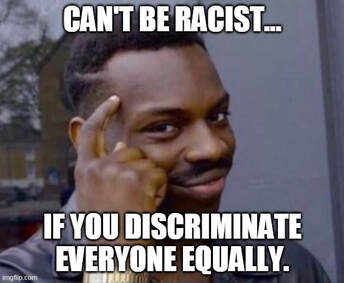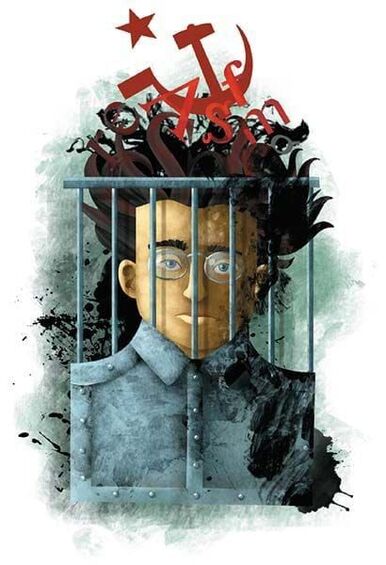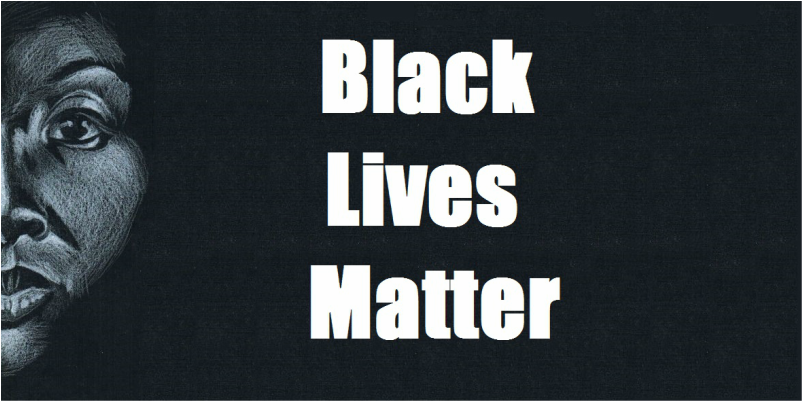|
The following short essay is part of a project initiated by The Sociological Cinema to introduce young people to sociological ideas and explanations regarding important social issues. In this case, I met via Zoom with one precocious young sociologist named Halcyeon for about 30 minutes each week from April to December 2020. Drawing from a wide range of resources, including The 1619 Project from The New York Times, we surveyed the history of race and racism in the United States. As the new year and our final class together approached, I asked Halcyeon to write down his thoughts about the cause of racism and what can be done to end it. What follows is his answer.

he root of racism in the U.S. is hard to pinpoint because it is so twisted. But the U.S. is not the only place that is racist. A lot of other countries are racist too. The main source, or as close as I can get to it, is the white slavers bringing black people over from Africa. The root cause of racism is because white slavers started to treat blacks as animals. Over time that started to create racism. Also white slavers beat black people, and to not feel guilty, white slavers thought black people were animals. At first, slavery and racism were not the same thing, slavery was “I conqured you, so you are my slave” and racism was “your black and I’m white, so I have more power than you.” The U.S. brought slavery and racism together. 
After slavery when black people got rights, white’s didn’t like it because, to them, giving black people rights is giving animals rights. Whites tried to suppress them again, so whites would not be equal to blacks. This piece of history is how racism started.
Racism is not a one-person problem. Racism is a group problem because people who have racist ideas find other people to back them up. In this way, racist people won't look weird because they are surrounded by a crowd of people who seem to share their ideas. Racism is a group problem so a group has to fix it. One person can’t change all the people’s minds in the U.S. just because he or she said something. That is not how the world works. You have to persuade them. Without the help of others, persuading them would take forever, so you need to have an antiracism group to back you up. So here it is: this is your one easy step to stop racism. Your antiracism group will slowly persuade people to join your group and then you can change so many people's minds at once. As you slowly change people's minds, people will slowly start to dislike racism even more until everyone hates racism. We don’t have to create a new antiracism group because such antiracism groups exist, like the Black Lives Matter group. So, we can jump into the fray and try to help overturn racism. We can all support Black Lives Matter just by putting a sign outside our front lawns. At least racism is not as bad as it was in the past because there was Jim Crow segregation and blacks could not go to the same school as whites. So let's pray that does not happen again. I hope the U.S. and all the other countries stop being racist. If we all work together, one day racism will cease to exist. Halcyeon A. Halcyeon A. is a 12-year-old 7th grader in middle school, who likes to play video games and watch anime. He also enjoys playing the clarinet and the sax while contemplating life during the pandemic.
The following short essay is part of a project initiated by The Sociological Cinema to introduce young people to sociological ideas and explanations regarding important social issues. In this case, I met via Zoom with one precocious young sociologist named Aeonian for about 30 minutes each week from April to December 2020. Drawing from a wide range of resources, including The 1619 Project from The New York Times, we surveyed the history of race and racism in the United States. With our final class approaching, I asked Aeonian to write down her thoughts about the cause of racism and what can be done to end it. What follows is her answer.

he root cause of racism in the U.S. is that racist people don’t want to be overpowered. Don’t just say white people are racist, that is a lie! White people aren’t the only racist people, other people can be racist too. My guess is 40% of white people are racist or have a racist history. The key point is that we must pay attention to how some people try to overpower other people based on race. 
How can American Society overcome racism?
Racist people could try to welcome BIPOC folks more. If a racist person were in a BIPOC person's shoes, the racist person would know how bad they are acting. I think racist people should think more about what they do. Racist people might think, “Well, ‘Black Lives Matter’ means other people's lives don’t matter,” but Black Lives Matter isn’t saying other lives don’t matter. Black Lives Matter is saying, “Our lives matter too.” Like I said, a lot of white people are racist, but other people can be racist too. There was a racist guy at my school who was in my brother’s fourth grade class, who went up to white people and said,” you need milk,” and then went up to black people and said, “you need chocolate milk.” He wasn’t white, he was Hispanic. Consider John H. Brown, who was a white abolitionist leader in America. He was able to support the abolitionist cause by becoming a conductor on the Underground Railroad and by establishing the League of Gileadites, an organization established to help runaway slaves escape to Canada. Whether people are Black, Indigenous, Asian, Hispanic, or white, the point is everyone should be against racism and willing to risk their lives to save other people’s because we all need to help each other. Aeonian A. Aeonian A. is a 5th grader in Connecticut. In her free time, she likes to read books, such as Fuzzy Mud or Holes, and she likes to play video games with her friends. Her favorite subjects are writing, reading, and sometimes math. 
he Italian Marxist revolutionary Antonio Gramsci dedicated much of his thought to the concept of crises. This was the result of him coming of age and then living through a series of crises on the world scale (WW1, the 1929 stock market crash), and a domestic crisis which was the direct result of the aftermath of the international crises (the rise of fascism in Italy). Many Marxists of the time tended to assume that capitalism’s periodic crises would inevitably usher in periods of socialist revolution and the overthrow of the old order by the new. Indeed, this was initially Gramsci’s view: following the first world war, he believed the crisis gripping capitalism and the Italian state to be ‘epochal’: “There can be no doubt that the bourgeois state will not survive the crisis. In its present condition, the crisis will shatter it”.
Yet Gramsci soon witnessed the growth of fascism and the stabilization of the crises by counter-revolutionary means, and came to realize that crises do not, in fact, have any given outcome, and certainly do not automatically lead to the inception of a new, progressive social order.
Gramsci realized that crises are often ongoing processes, not singular events. Crises can be short, or they can last for decades. Far from being ‘apolitical’, then, a crisis is therefore a uniquely political period: it is a distinct, new, political terrain upon which socialists must be able to struggle. Mark Fisher famously wrote that such is the dominance of neoliberalism, it is now easier to imagine the end of the world than the end of capitalism. The sheer resilience and dominance of capitalism can become incredibly disheartening, even debilitating, for leftists. Yet crises can change this overnight. Crises can blow apart the status quo. In their panic to solve the crisis, the state and ruling class fall back into their natural form and abandon any pretense of being ‘for the people’, instead openly prioritizing the protection of capital. This in turn reveals the state and ruling classes to be “a narrow clique which tends to perpetuate its selfish privileges by controlling or stifling opposition forces” (Gramsci 1971: 189). In other words, during periods of crises, the state is unmasked. Given the capital's status as a major global financial hub, Mr. Johnson and Rishi Sunak, chancellor, were determined not to further alarm the markets by putting the city into lockdown
This in turn can lead to a ‘crisis of hegemony’ or legitimacy- people essentially move from a state of passivity into a state of politicization, and possibly militancy. They no longer believe the lies they have been told, but see things as they really are. Periods of crisis therefore represent unique opportunities for the left. Despite the best efforts of the British media to defend the Government at all costs, during this crisis hundreds of thousands of working class people on the frontlines will come to realize numerous things to be indisputably true: that their government and employers literally do not care if they live or die; that austerity was needless and deliberate; that working class people keep society going, despite being paid next to nothing. People who were previously comfortable may have had to sign up for Universal Credit for the first time and witness first hand how dystopian the system is. People may have been sucked into conflict with their employer for the first time and realized how little they are valued. People may be being chased for rent by their landlord and realize how unequal their relationship is. This mass realization, rooted in lived experience, in things you have seen with your own eyes, is invaluable. When you have witnessed for yourself first-hand what Engels called the ‘social war’ being waged against working class people, and realized what side you are on, no amount of propaganda or spin can ever undo that. Even people not on the frontlines or those lucky enough to be furloughed or working from home- will also likely have had epiphanies during this period. People will hopefully realize what is most important and precious in life- family, friends, community, health; and what is not- work, profit, consuming. The left must therefore fight relentlessly during this period to ensure people become politicized, that they don’t forget how they felt during this crisis, that they join the dots between what is happening and the political decisions taken by the Tories over the last decade and realize that this tragedy could’ve been avoided. Socialists must firstly fight the immediate battle related to the virus: to expose the social murder caused by the callous herd immunity strategy and the desperate lack of PPE; draw attention to the lack of testing; point out the austerity-imposed weaknesses of the NHS and social care that this crisis has exposed; the crony capitalism at the heart of the ventilator debacle, and so on. But we must also use the crisis to demand and to pre-empt significant long term changes to our politics. It just so happens that the huge public spending that the government has been forced into during the crisis has demonstrated that all the things which were previously written off as unrealistic and impossible are in fact eminently achievable and indeed necessities: an end to austerity, replaced by huge investment in public services, particularly the NHS; the nationalization of social care; an immediate pay increase for all essential workers.  Antonio Gramsci (1891-1937) | Artist: Ricardo Figueroa Antonio Gramsci (1891-1937) | Artist: Ricardo Figueroa
Ultimately, we must force a paradigm shift in values, our way of ordering society. ‘The economy’ has been revealed to be arbitrary bullshit. The huge amounts of money ‘magicked’ up and the ease with which companies can be repurposed for socially useful ends show that we have all the resources we need to build a better world based on kindness, care and community rather than profit. People in socially useful jobs could and should be paid significantly more, many people could work from home, we could all work a lot less and be a lot happier. We could entirely re-order our society for the better very easily if we abandon the profit motive.
The right, as ever, is displaying a far better grasp of power and the nature of the crisis than the liberal centre. They clearly realize that they are in a fight and that their hegemony is under threat. This is why they are relentlessly attempting to depoliticize the crisis, to use Boris’ time in ICU as a propaganda tool, to shift blame, to diffuse responsibility, to appeal to nationalism using the language of sacrifice- ‘we are all in this together’. After all, this is a Government experienced in fighting culture wars and invoking nationalism to get people to support them. There is a limited window of opportunity here. If the left do not make the most of this, then the window will slam shut. To use Gramsci’s military metaphor, if the capitalist state is a mighty fortress, then the crisis blows a huge hole in its walls, dramatically weakening it. Whilst this is a huge opportunity, in itself it is no guarantee of victory: if the left do not seize the initiative, the state will rebuild using its huge apparatuses, prevent further damage using its ‘defensive fortifications’ in the media and civil society, repel the attack, and indeed emerge victorious. He wrote: “The traditional ruling class, which has numerous trained cadres, changes men and programmes and, with greater speed than is achieved by the subordinate classes, reabsorbs the control that was slipping from its grasp. Perhaps it may make sacrifices, and expose itself to an uncertain future by demagogic promises; but it retains power, reinforces it for the time being, and uses it to crush its adversary and disperse his leading cadres” Tragically, it is clear that the new leader of the Labour party will not capitalize on the current fragility of the status quo. Kier Starmer’s ‘forensic’ approach to holding the Tory government to account clearly amounts to little more than scrutinizing the detail of their strategy without morally opposing any of it. He is getting behind the Government and waiting for this all to blow over before he acts, failing to realize that the time to strike is now. He certainly will not use this period to demand the end to austerity or other radical policies. The right wing trade unions have proven to be little better. Faced with the deaths of frontline workers, they have been typically timid, despite the fact that this is a period of unprecedented leverage for the labour movement. The biggest mistake now would be for the young militants in the Labour party to spend their time obsessing over the Labour Party- do I leave, do I stay?- and trying to persuade Starmer or the Unions to act. Instead, the vitality and energy of the Corbyn movement must be urgently channeled into the sort of grassroots activism and protest which birthed Corbynism in the first place. The impetus and drive for radical change must come from below, from workers and activists whose militancy is continually smothered by the cowards and bureaucrats within the hierarchy of the Labour movement. Across the world during this crisis workers have become politicized and militant. Wildcat strikes and walkouts have proliferated, and organized workers have won significant victories without waiting for Union leaders to act. If nurses and doctors and other key workers go on strike or walkout during this period, the government would have no choice but to capitulate. If the left does not fight, then we face an extremely dark future. If the left allows the Tories to emerge from this unscathed, then the crisis may well be ‘resolved’ by the forces of reaction. Throughout history, fascism has repeatedly emerged out of crises similar to this one. To ‘pay for the coronavirus spending’, we may well see a return to turbo charged austerity, the likes of which we have never seen. We are alread faced with a massively increased unemployed population, and this will grow as many employers will likely lay off more people as we come out of the lockdown as they seek to get their profit margins back to normal after the hit they have taken. This swollen reserve army of labour would doubtless be used to discipline the people who are ‘lucky’ enough to keep their jobs. The disturbing ‘Coronavirus Bill’ has also given the British government unprecedented and draconian powers which may well be used to curtail civil liberties, including increased surveillance and the banning of political protests. But, let’s say there is a stabilizing period. Boris Johnson is a skilled populist after all- maybe he will give NHS workers a pay rise, announce permanent, massive state intervention in the economy, a big state funeral for the dead, a memorial stone. The red arrows could do a fly past, the Queen could be wheeled out to give a speech. Maybe we could return to ‘normality’. This would surely be temporary. The coronavirus represents the most drastic, global manifestation of a series of crises that has beset global capitalism over the last decade. If this current crisis ever stabilizes, the system will be almost immediately hit with new crises: a potential global recession; the collapse of the EU amidst increasing competition for resources; increasing conflict on the international scale (again, related to competition over resources related to the pandemic); and of course, the rapidly escalating collapse of the global ecosystem which will increasingly encroach on our daily lives even in the developed West. Climate change will also, crucially, lead to more pandemics. Whilst the cyclical crises of capitalism can be temporarily stabilized, climate change cannot. Climate change represents a true ‘epochal’ crisis, i.e., one which is catastrophic for humanity, and one that there is no vaccine for- it will kill us all, unless we overthrow capitalism. The cessation of capitalism during this crisis has provided us a glimpse into how we could potentially pull back from the brink of climate catastrophe- as fossil fuel use has slowed dramatically with planes being grounded and no cars on the road, carbon emissions are down significantly, leading to environmental improvements that are visible from space. Changing our values and way we order the economy- ending capitalism- is therefore not a fluffy, hippy pipe dream, but an absolute necessity if the planet and humanity is to survive. Moderate centrism cannot help us- we need a global ecological revolution. The coronavirus, whilst an unprecedented human tragedy, has inadvertently provided us with a blueprint of how to overcome this. We have to seize the moment and start fighting now. Dan Evans Dan Evans is a sociological researcher with a range of interests, including Welsh devolution and the political economy of Wales; The political thought of Antonio Gramsci; Ethnography and ethnographic methods; Pierre Bourdieu and everyday class analysis; Welsh national identity and everyday ethnicity; the Welsh language in Wales; Place, belonging and the role of material culture; Marxist and other critical perspectives on education.
For many, the election of Donald Trump as the next President of the United States signals a return to more overt policies of discrimination against historically marginalized communities. The prospect of criminal justice reform seems particularly bleak under a Trump presidency. But people forget that social and political change are not exclusively the result of presidents wielding power. Social movements and other forms of popular resistance have often served as important catalysts for profound ideological and structural changes, and there is perhaps no better contemporary example than the Black Lives Matter movement.
As it happens, Donald Trump's ascendancy comes at a precarious time for Black Lives Matter because the movement appears to be engaged in an attempt to introduce a new strategy. In the immediate aftermath of officer Darren Wilson killing Michael Brown in Ferguson, Missouri, Black Lives Matter focused on getting the word out and convincing the American public that black and brown people are the disproportionate targets of police violence. More recently, however, activists have been trying to get people within the movement elected to public office at all levels of government. This podcast is the second of two parts featuring Dr. Rashawn Ray, Associate Professor of sociology from the University of Maryland. In part 1, Lester Andrist sits down with Rashawn Ray to discuss what makes police violence institutional and what institutional racism looks like in the United States. In this latest installment, Dr. Ray discusses the success of the Black Lives Matter movement and whether it will continue to be an effective force for promoting social and political change under a Trump presidency.
You can find ten policy proposals for reforming the criminal justice system on the Black Lives Matter Campaign Zero website. We used an excerpt from an interview with DeRay Mckesson on RT's program Watching the Hawk. You can find the full interview with Mckesson here. Music from http://www.bensound.com. Banner art from Abigail Southworth
|
.
.
Tags
All
|


 RSS Feed
RSS Feed